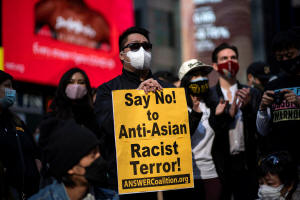Police, communities across U.S. fight back against anti-Asian hate
crimes
 Send a link to a friend
Send a link to a friend
 [April 05, 2021]
By Brittany Hosea-Small, Nathan Layne and Rich McKay [April 05, 2021]
By Brittany Hosea-Small, Nathan Layne and Rich McKay
SAN JOSE, California (Reuters) - More than
a dozen San Jose, California, police officers walked through the white
arches of the Grand Century Mall in "Little Saigon" to reassure a
Vietnamese-American community fearful over the rise in anti-Asian hate
crimes in the United States.
The officers walked through the arcade of hair and nail salons,
restaurants serving Vietnamese cuisine, and herbal medicine shops on
Saturday, talking to business owners and patrons. They then conducted a
similar tour of San Jose's Japantown, where a citizen patrol group was
formed following the deadly attacks on Asian spas in the Atlanta area on
March 16.
"We know that there is a lot of angst, fear with our Asian community,"
said San Jose's police chief, Anthony Mata, during his visit to Little
Saigon. "It's important for us to have that dialogue, engage with them
and see how we can help."
Across the United States, law enforcement agencies are scrambling to
better protect Asian communities amid a wave of violence targeting them
since lockdowns to cope with the coronavirus pandemic began about a year
ago. A recent report by the Center for the Study of Hate and Extremism
at California State University, San Bernardino, showed that while hate
crimes overall in the United States had fallen slightly in 2020, crimes
against Asian Americans and Pacific Islanders (AAPI) had jumped by 145%.

A vicious assault last week in which a man kicked a 65-year-old
immigrant from the Philippines in New York City multiple times was
captured on video and went viral, further stoking fears about anti-Asian
hate crimes.
New York City has deployed a team of undercover Asian police officers.
Other major cities, from San Jose to Chicago, have boosted patrols in
Asian neighborhoods and sought to forge closer ties with communities,
some of which have sought to fill gaps the police can't fill.
Leanna Louie, who has organized residents to patrol San Francisco's
Chinatown, said the city's police force of about 2,000 doesn't have the
resources. "It's impossible," she said.
Paul Luu, chief executive officer of the Chinese American Service
League, welcomed the "revved up" police presence in Chicago's Chinatown,
which he said built on an already supportive relationship that includes
Chinese-speaking officers on the beat. His group is focused on educating
the community on hate crimes and encouraging victims, many reluctant due
to language barriers or wariness of the police, to come forward.
Luu pointed to a recent attack on a 60-year-old Vietnamese immigrant on
the North Side of Chicago who was initially reluctant to file a report.
Official data shows Chicago recorded two anti-Asian hate crimes in 2020
-- the same as 2019 -- while such crimes spiked to 28 in New York last
year from three in 2019.

"The numbers may be very low in Chicago, but it does not mean that it is
not happening," Luu said.
[to top of second column]
|

People attend the Stop Asian Hate rally at Times Square in New York
City, U.S., April 4, 2021. REUTERS/Eduardo Munoz

DRIVEN BY DISINFORMATION
Not everyone believes more policing is the answer.
Grace Pai, director of organizing at the Chicago branch of Asian
Americans Advancing Justice, said she is against a larger police
presence, citing distrust of law enforcement.
Pai said the police response in the Atlanta area shootings, where an
officer seemed to minimize the attack by saying the shooter had "a
really bad day," was emblematic of a broader police bias. Six of the
eight killed were of Asian descent.
"Asian Americans have been negatively impacted by policing," she
said. "We really don't see the police playing a role in stopping
these crimes from occurring."
Since the Atlanta shootings, the Los Angeles Police Department has
increased patrols and police visibility where many people of Asian
heritage live and work, especially in and around Chinatown,
Koreatown and Little Tokyo.
Blake Chow, who is the AAPI coordinator for the Los Angeles Police
Department, said comments made by then-President Donald Trump
blaming the pandemic on China and using remarks such as the "kung
flu" have contributed to anti-Asian sentiment.
"We don't have evidence of any hate group operating in LA that is
focusing on the Asian, Pacific Islander community," said Chow, a
deputy police chief. "The rise is seen in individual acts and it
seems driven by disinformation on COVID, some of it from the former
president."
Chow said the department is holding forums with the AAPI community
to get feedback on what more the police should do, as well as to
educate community members on how to report troubling encounters,
even if they may not amount to a crime, such as when someone utters
a racial slur.

"We want to document hate incidents, as they can be a forerunner to
an actual hate crime. If we can document a pattern of conduct and
track those, we can bring it to a judge for enhanced sentencing."
The rise in attacks so alarmed retired San Jose police veteran Rich
Saito that he added a patrol unit to a community group keeping watch
over Japantown. Deluged by offers to help, Saito said he has trained
40 to 50 volunteers to walk the streets and document and report any
suspicious activity.
"I'm very concerned about the safety of this community, especially
the seniors," said Saito, who escorted police chief Mata on a tour
of the neighborhood on Saturday. "The police department does the
best it can, but they can't be here all the time, every day."
(reporting by Brittany Hosea-Small in San Jose, Rich McKay in
Atlanta and Nathan Layne in Wilton, Connecticut; editing by Paul
Thomasch and Jonathan Oatis)
[© 2021 Thomson Reuters. All rights
reserved.] Copyright 2021 Reuters. All rights reserved. This material may not be published,
broadcast, rewritten or redistributed.
Thompson Reuters is solely responsible for this content. |